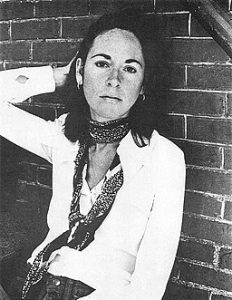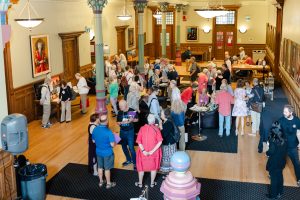[Editor’s note: We’re so happy to welcome Rosemary Gould back to Toronto Pursuits for the first time since 2019. She’ll be leading The Storytellers, an exploration of narrative, drama, and storytelling in poetry. In this blog post she introduces her approach to discussing poetry. For many years, Rosemary has turned the poetry-wary into poetry lovers through her skilled leadership and used of Shared Inquiry.]
When I lead a poetry seminar, we always begin by reading the poem out loud. The poem then has a presence in the room, and when we start to discuss it we are more prepared to savor its beauty and richness of meaning. The poem is the teacher. I’m just facilitating the work we do to understand it.
I mostly follow the Shared Inquiry method developed by the Great Books Foundation, asking participants to leave out the biography of the poet and focus instead on the words on the page. I ask lots of questions and don’t share my own views. I find I don’t even have my own views while the discussion is going on because I’m so focused on drawing out what each participant might be thinking.
I follow up on points I feel can be explored further. I ask participants to listen carefully to each other and respond to what others have added. It’s a complex and demanding game that we play, teasing out a sense of “getting” the poem, feeling that its mystery has been fully and satisfyingly explored.
The seminar group gradually becomes a team that knows and appreciates each person’s point of view, and we work together to make the meaning of the poem be what it is for us in that moment, not what the author intended or what a literary scholar might write about it. That’s a richer experience than just learning what an expert thinks. While it’s true that some interpretations of a poem seem more accurate than others, if it’s a great poem, none of them will ever be comprehensive. I also believe the poet did not know and could not know the full meaning of the poem because many things change in culture over time and different cultures hold different values, but somehow a great poem continues to provide meaning in infinitely different contexts.
As an example, how would we discuss Louise Glück’s poem below? (Glück won the Nobel Prize for Literature in 2020, and I will include this poem in the compendium participants will receive.)
 “The Wild Iris”
“The Wild Iris”
At the end of my suffering
there was a door.
Hear me out: that which you call death
I remember.
Overhead, noises, branches of the pine shifting.
Then nothing. The weak sun
flickered over the dry surface.
It is terrible to survive
as consciousness
buried in the dark earth.
Then it was over: that which you fear, being
a soul and unable
to speak, ending abruptly, the stiff earth
bending a little. And what I took to be
birds darting in low shrubs.
You who do not remember
passage from the other world
I tell you I could speak again: whatever
returns from oblivion returns
to find a voice:
from the center of my life came
a great fountain, deep blue
shadows on azure seawater.
I can’t really explain how we would discuss it because the actual experience will be unique. But since this is a seminar about poetry as storytelling, I’ll be sure to ask who is speaking. Who is the narrator of this story? That discussion is likely to tease out the subtle relationship between the human voice using language to tell us what happened and the symbol of the iris that perhaps provides something of the poem’s narrative structure.
What is the story here? Doesn’t it seem as though the speaker was miserable and then something changed? Why doesn’t the poet tell us what that was? Why make use of this symbol instead? When I ask that, I’m not trying to get at what the author’s intentions were. What I really mean is: what effect does it have on us that this story is told in this symbolic way? What effect does it have on you right now?
I also hope to ask about the seeming impossibilities. How can someone remember that which we call death? And why describe death like that? If the rest of us have not yet experienced what the speaker is describing, as the poem seems to assert, can we relate to it?

Many modern poems tell stories from this place of experiencing something extraordinary that the reader, it is assumed, will find nearly incomprehensible, which recalls for me Wordsworth’s declaration that, “Poetry is the spontaneous overflow of powerful feelings: it takes its origin from emotion recollected in tranquility.”
Does modern poetry conform to this definition? I feel that “The Wild Iris” both does and does not. There are certainly powerful emotions recollected here, but also there was an experience that could not be told any other way than this, even though this way of telling it leaves so much unsaid. As a facilitator, my goal will be to protect the mystery hidden within the story as well as to help us explore it.
Join me for The Storytellers at Toronto Pursuits 2024.
— Rosemary
